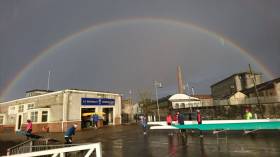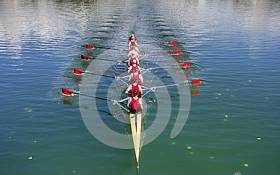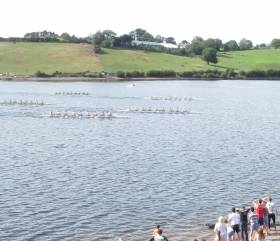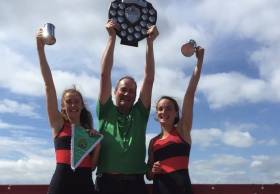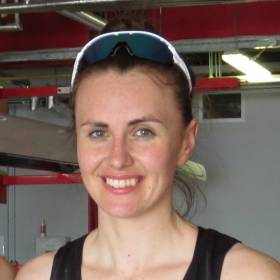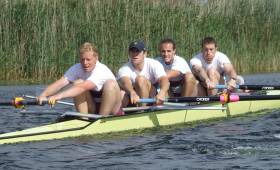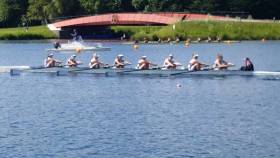Displaying items by tag: NUIG
St Michael's Head Gives UCD Eight a Boost
#Rowing: UCD’s men’s intermediate eight just came out on top as the fastest crew at the St Michael’s Head of the River in Limerick. They clocked 19 minutes and 39 seconds, just ahead of the 19 minutes 43.4 seconds of the NUIG senior eight. Carlow Rowing Club’s women’s junior coxed four just pipped NUIG’s women’s senior eight as the fastest women’s crew.
| Rank | Bib nr | Name | Result | Penalty | Speed |
| Womens J18A 2X | |||||
| 1 | 48 | St. Michael's Rowing Club | 00:33:30.0 | 9.31 km/h | |
| Womens Novice 4X+ | |||||
| 1 | 20 | St. Michael's Rowing Club | 00:35:08.7 | 8.88 km/h | |
| Mens Senior 8+, (A) | |||||
| 1 | 1 | NUIG Boat Club | 00:19:43.4 | 15.82 km/h | |
| Mens Intermediate 8+, | |||||
| 1 | 3 | UCD Boat Club | 00:19:39.0 | 15.88 km/h | |
| Mens Club 1 8+, | |||||
| 1 | 4 | UL Boat Club | 00:23:31.2 | 13.27 km/h | |
| Mens J18A 4X-, | |||||
| 1 | 6 | Athlunkard Boat Club | 00:27:00.5 | 11.55 km/h | |
| 2 | 107 | Colaiste Iognaid Rowing Club | 00:27:09.2 | 11.49 km/h | |
| Mens Intermediate 4-, | |||||
| 1 | 8 | St. Michael's Rowing Club | 00:22:37.2 | 13.79 km/h | |
| 2 | 9 | Uni of Limerick Rowing Club | 00:22:55.1 | 13.61 km/h | |
| Mens Masters 8+, (A) | |||||
| 1 | 10 | Castleconnell BC | 00:35:04.3 | 8.90 km/h | |
| Mens Masters 8+, | |||||
| 1 | 11 | St. Michael's Rowing Club | 00:23:43.0 | 13.16 km/h | |
| 2 | 12 | Athlone Boat Club | 00:24:07.7 | 12.93 km/h | |
| Mens Masters 8+, (B) | |||||
| 1 | 13 | Castleconnell BC | 00:20:45.9 | 15.03 km/h | |
| Womens Senior 8+, | |||||
| 1 | 14 | NUIG Boat Club | 00:22:50.8 | 13.66 km/h | |
| Mens J18A 4+, | |||||
| 1 | 16 | Carlow Rowing Club | 00:22:49.6 | 13.67 km/h | |
| 2 | 15 | St. Joseph's College RC | 00:22:50.2 | 13.66 km/h | |
| 3 | 17 | Colaiste Iognaid Rowing Club | 00:23:11.1 | 13.46 km/h | |
| 4 | 18 | Athlunkard Boat Club | 00:25:07.9 | 12.41 km/h | |
| Mens Senior 2X, | |||||
| 1 | 19 | Galway Rowing Club | 00:27:50.6 | 11.21 km/h | |
| Mens Club 1 2X, | |||||
| 1 | 21 | Carlow Rowing Club | 00:25:53.3 | 12.05 km/h | |
| Mens J18A 2X, | |||||
| 1 | 24 | St. Michael's Rowing Club | 00:23:27.5 | 13.30 km/h | |
| 2 | 22 | Castleconnell BC | 00:25:15.0 | 12.36 km/h | |
| 3 | 26 | St. Joseph's College RC | 00:25:53.1 | 12.05 km/h | |
| 4 | 25 | St. Michael's Rowing Club | 00:26:13.8 | 11.89 km/h | |
| 5 | 23 | Colaiste Iognaid Rowing Club | DNS | - | |
| Womens J18A 8+, | |||||
| 1 | 28 | St. Michael's Rowing Club | 00:24:58.7 | 12.49 km/h | |
| 2 | 30 | Galway Rowing Club | 00:25:43.2 | 12.13 km/h | |
| 3 | 29 | Colaiste Iognaid Rowing Club | 00:26:11.1 | 11.92 km/h | |
| 4 | 27 | Shannon Rowing Club | 00:28:12.2 | 11.06 km/h | |
| Mens J16 8+, | |||||
| 1 | 31 | Colaiste Iognaid Rowing Club | 00:22:27.1 | 13.90 km/h | |
| 2 | 32 | St. Michael's Rowing Club | 00:25:44.5 | incl. +30 sec. | 12.36 km/h |
| 3 | 33 | St. Joseph's College RC | DNS | - | |
| Womens Club 1 8+, | |||||
| 1 | 34 | Uni of Limerick Rowing Club | 00:25:20.7 | 12.31 km/h | |
| Mens Masters 4X-, (A) | |||||
| 1 | 35 | Galway Rowing Club | 00:24:13.6 | 12.88 km/h | |
| Mens Masters 4X-, (B) | |||||
| 1 | 36 | Galway Rowing Club | 00:26:00.5 | incl. +90 sec. | 12.73 km/h |
| Mens Masters 4X- | |||||
| 1 | 37 | St. Michael's Rowing Club | DNS | - | |
| Mens J16 4X+, (A) | |||||
| 1 | 38 | Castleconnell BC | 00:26:06.0 | 11.95 km/h | |
| Mens J16 4X+, (B) | |||||
| 1 | 39 | Castleconnell BC | 00:25:28.9 | 12.24 km/h | |
| Mens J16 4X+, | |||||
| 1 | 42 | St. Michael's Rowing Club | 00:27:51.1 | 11.20 km/h | |
| 2 | 43 | St. Joseph's College RC | 00:27:52.1 | 11.20 km/h | |
| 3 | 41 | Shannon Rowing Club | 00:29:57.1 | 10.42 km/h | |
| 4 | 40 | Colaiste Iognaid Rowing Club | 00:33:46.0 | 9.24 km/h | |
| Mens Masters 4X+, | |||||
| 1 | 45 | St. Michael's Rowing Club | 00:27:46.1 | 11.24 km/h | |
| 2 | 144 | Athlone Boat Club | DNS | - | |
| Womens J18A 4X-, | |||||
| 1 | 47 | Colaiste Iognaid Rowing Club | 00:25:46.4 | 12.11 km/h | |
| 2 | 5 | Clonmel Rowing Club | 00:26:20.9 | 11.84 km/h | |
| 3 | 46 | Castleconnell BC | 00:26:23.0 | 11.83 km/h | |
| Womens Club 1 4X-, | |||||
| 1 | 49 | St. Michael's Rowing Club | DNS | - | |
| Mens Masters 4+, | |||||
| 1 | 51 | St. Michael's Rowing Club | 00:24:40.1 | 12.65 km/h | |
| 2 | 50 | Athlone Boat Club | DNS | - | |
| Mens J16 4+, | |||||
| 1 | 52 | Shannon Rowing Club | 00:28:25.4 | 10.98 km/h | |
| Mens Masters 2X, | |||||
| 1 | 54 | St. Michael's Rowing Club | 00:24:14.1 | 12.87 km/h | |
| 2 | 53 | Castleconnell BC | 00:27:19.4 | 11.42 km/h | |
| Mens Senior 1X | |||||
| 1 | 55 | St. Michael's Rowing Club | 00:25:40.7 | 12.15 km/h | |
| Womens J16 8+, | |||||
| 1 | 56 | St. Michael's Rowing Club | 00:29:15.4 | 10.66 km/h | |
| Womens J18A 2X, | |||||
| 1 | 57 | Castleconnell BC | DNS | - | |
| 2 | 158 | Colaiste Iognaid Rowing Club | DNS | - | |
| Womens Intermediate 4+, | |||||
| 1 | 59 | NUIG Boat Club | 00:25:34.0 | 12.20 km/h | |
| Womens Masters 8+, | |||||
| 1 | 60 | Uni of Limerick Rowing Club | 00:29:34.3 | 10.55 km/h | |
| Womens J16 4X+, | |||||
| 1 | 62 | Colaiste Iognaid Rowing Club | 00:31:43.4 | 9.84 km/h | |
| 2 | 63 | Shannon Rowing Club | 00:32:19.8 | 9.65 km/h | |
| 3 | 61 | Athlunkard Boat Club | 00:33:52.9 | 9.21 km/h | |
| Womens Novice 4X+, | |||||
| 1 | 65 | Uni of Limerick Rowing Club | 00:31:27.0 | 9.92 km/h | |
| Womens Masters 4X- | |||||
| 1 | 66 | Soc des Régates Messines | 00:31:05.0 | 10.04 km/h | |
| Mens Touring 4X+ | |||||
| 1 | 67 | LBC / SMRC | 00:46:21.0 | 6.73 km/h | |
| Late Entry | |||||
| 1 | 84 | Unknown | DNS | - | |
| 2 | 82 | Unknown | DNS | - | |
| 3 | 85 | Unknown | DNS | - | |
| 4 | 83 | Unknown | DNS | - | |
| 5 | 81 | Unknown | DNS | - | |
| Mens Senior 4+ | |||||
| 1 | 2 | NUIG Boat Club | DNS | - | |
| Womens Intermediate 2X | |||||
| 1 | 64 | St Michaels Rowing Club | 00:27:23.9 | 11.39 km/h |
Neville Competes in Two New Zealand Semi-Finals
#Rowing: Kevin Neville competed in two semi-finals at the New Zealand Rowing Championships on Thursday. The NUIG man, competing for Wairau, finished sixth in the senior single sculls and fifth in the senior double. He is set to compete in B Finals. In the club singles semi-final, Eamon Power finished eighth and is also bound for a B Final.
New Zealand Rowing Championships, Lake Karapiro, Day Three (Irish interest)
Men
Sculling, Double – Senior - Semi-Final One (First Four to A Final; rest to B Final): 5 Wairau (2 K Neville) 6:56.17.
Single – Senior - Semi-Final Two (First Four to A Final; rest to B Final): 6 Wairau (K Neville) 8:08.97.
Club – Semi-Final One (First Four to A Final; rest to B Final): Wairau (E Power) 8:05.86.
#Rowing: The big crowds saw a close and exciting senior men’s eight final at the Irish Rowing Championships. Commercial carved out a small lead early on, and despite pressure from NUIG and Skibbereen, they held on to win.
In the women’s senior eights final, UCD/Old Collegians had to wait until the middle stages to take over in the lead, but once they did they built and built on it. They had over three seconds at the finish over Skibbereen/UCC.
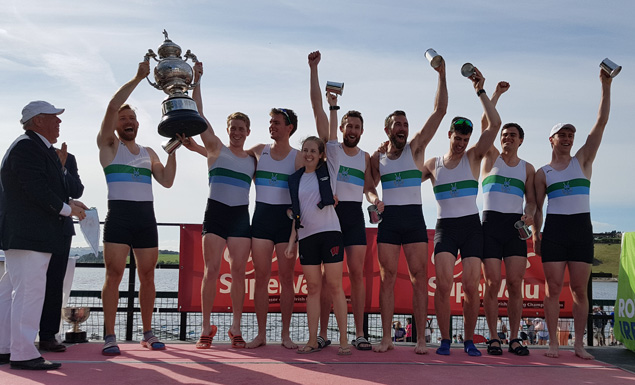 Winners of senior men’s eights (Commercial)
Winners of senior men’s eights (Commercial)
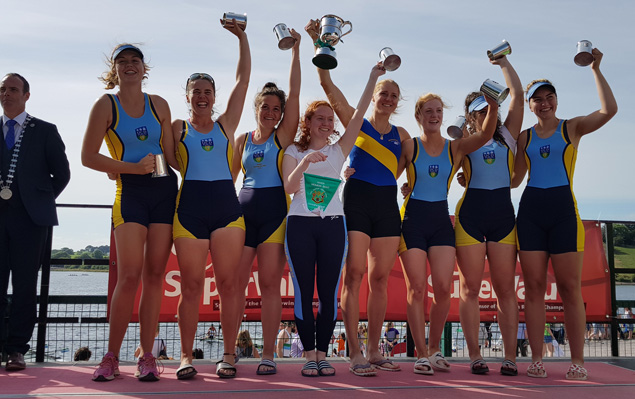 Winners of senior women’s eights (UCD/Old Collegians – Claire Lambe not included)
Winners of senior women’s eights (UCD/Old Collegians – Claire Lambe not included)
NUIG took their ninth title as they lifted the women’s club eight, while Enniskillen brought a very successful end to a good regatta for them by taking the men’s junior pair through Aaron Johnston and Nathan Timoney.
Three Castles also had a fruitful Championships and their junior quadruple won.
Lee and Clonmel won the women’s junior quad and the men’s intermediate double respectively and Bann’s Hannah Scott took the women’s intermediate single sculls title.
Irish Rowing Championships, National Rowing Centre, Day Three (Selected Results)
Men
Eight – Senior: 1 Commercial 5:46.04, 2 Skibbereen 5:47.95, 3 NUIG 5:48.39. Novice: Queen’s 6:21.56.
Four – Club, coxed: NUIG A 6:43.38.
Pair – Inter: NUIG 6:56.09. Junior: Enniskillen B 6:52.04.
Sculling, Quadruple – Junior: 1 Three Castles 6:21.53, 2 Shandon 6:22.75, 3 Clonmel 6:23.05.
Double – Inter: Clonmel 6:37.17. Junior: Three Castles A 6:50.22.
Single – Lightweight: Skibbereen (G O’Donovan) 7:22.32. Inter: Clonmel (D Lynch) 7:10.25.
Women
Eight – Senior: 1 UCD/Old Collegians 6:24.84, 2 Skibbereen/UCC 6:27.96, 3 NUIG/Cork 6:33.67. Club: NUIG 6:46.97.
Four – Inter, coxed: NUIG 7:23.65.
Pair – Senior: UCD (A Crowley, E Lambe) 7:37.41. Junior: Fermoy 7:53.37.
Sculling, Quadruple – Junior: Lee 6:54.96.
Single – Senior: Old Collegians (S Pupsure) 8:02.64. Lightweight: Skibbereen (D Walsh) 8:09.96. Inter: Bann (H Scott) 7:55.58. Club One: Carlow (C Nolan) 8:15.22.
#Rowing: Skibbereen took two titles and NUIG took three from the second set of finals on the third day of the Irish Rowing Championships at the National Rowing Centre.
Gary O’Donovan and Denise Walsh had very easy wins in the bright sunshine in the finals of the lightweight single sculls. NUIG’s victories – which bring them to eight so far – came in the men’s intermediate pair, where they were tested by Shandon; the women’s intermediate coxed four and the men’s club coxed four.
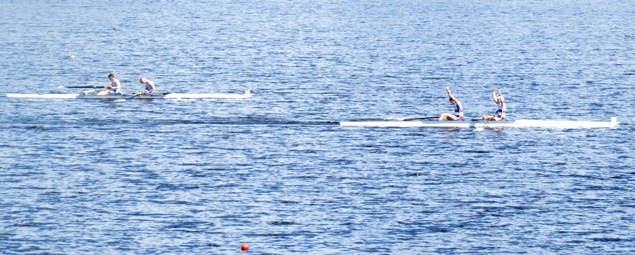 NUIG celebrate after beating Shandon in the intermediate men's pair
NUIG celebrate after beating Shandon in the intermediate men's pair
Eliza O’Reilly and Gill McGirr have been the best junior pair in the country this year and the Fermoy crew proved it with their convincing win. Daire Lynch was similarly emphatic as he took the intermediate single sculls title for Clonmel.
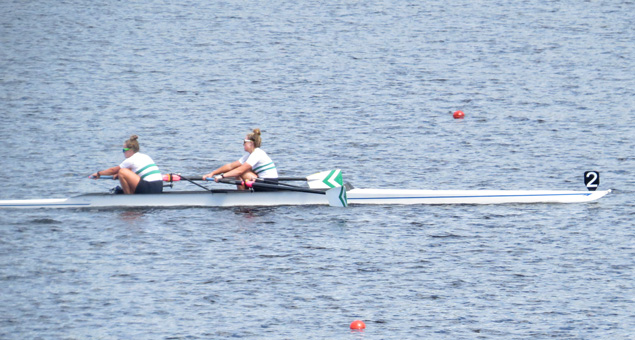 Fermoy on their way to winning the women's junior pair
Fermoy on their way to winning the women's junior pair
Rory Quinn and Oisin Clune of Three Castles added another win to the one they had earlier taken in the junior quadruple when they won the junior double.
Irish Rowing Championships, National Rowing Centre, Day Three (Selected Results)
Men
Eight – Novice: Queen’s 6:21.56.
Four – Club, coxed: NUIG A 6:43.38.
Pair – Inter: NUIG 6:56.09
Sculling, Quadruple – Junior: 1 Three Castles 6:21.53, 2 Shandon 6:22.75, 3 Clonmel 6:23.05.
Double – Junior: Three Castles A 6:50.22.
Single – Lightweight: Skibbereen (G O’Donovan) 7:22.32. Inter: Clonmel (D Lynch) 7:10.25.
Women
Four – Inter, coxed: NUIG 7:23.65.
Pair – Senior: UCD (A Crowley, E Lambe) 7:37.41. Junior: Fermoy 7:53.37.
Sculling, Single – Senior: Old Collegians (S Pupsure) 8:02.64. Lightweight: Skibbereen (D Walsh) 8:09.96. Club One: Carlow (C Nolan) 8:15.22.
Early Movers Take Spoils at Irish Rowing Championships
#Rowing: On a morning of clear victories, David Higgins of Presentation Boat Club, Cork, had to battle to see off Luke Hayes-Nally of Shandon to take the Club Singles title at the National Rowing Centre.
The other wins in the Saturday morning session of the Irish Rowing Championships followed the pattern of one crew gaining an early lead and winning well. Mark O’Donovan and Shane O’Driscoll in the pair; NUIG in the women’s novice eight; Enniskillen in the men’s junior coxed four and Cork Boat Club’s Lisa Dilleen and Chloe Mehigan in the women’s intermediate double all came home well clear of the field.
Hannah Scott made her move so early that she had three-quarters of the junior single sculls final as clear leader. Margaret Cremen held off Aoife Casey for second.
The men’s intermediate eight final was a UCD affair – their A crew beat their B crew in a tight finish.
Irish Rowing Championships, Day Two (Selected Results)
Men
Eight – Intermediate: UCD 5:50.02.
Four – Junior, coxed: Enniskillen 6:22.94.
Pair – Senior: Skibbereen 6:59.69.
Sculling, Single – Club: Cork (D Higgins) 7:26.59.
Women
Eight – Novice: NUIG 6:38.95.
Sculling, Double – Intermediate: Cork 7:09.95.
Single – Junior: Bann (H Scott) 7:41.22.
#Rowing: Skibbereen added four titles to their already weighty tally on the first day of the Irish Rowing Championships at the National Rowing Centre today. Paul O’Donovan won the senior single sculls and teamed up with Mark O’Donovan, Shane O’Driscoll and his brother Gary in the senior four – both were done in new record times for the course. Paul and Gary also won the senior doubles. The Skibbereen women’s four also won well, in a new best time for the course.
NUIG also took four titles: the men’s intermediate coxed four and club eight and the women’s club coxed four and novice coxed quadruple.
Cork Boat Club proved best in the women’s intermediate eight and also won perhaps the best race of the day: Barry O’Flynn was severely tested by Jack Dorney in the junior single sculls but fought back after being passed and won by a length.
The Old Collegians victory in the women’s senior double was straightforward: Sanita Puspure and Claire Lambe were by far the best crew.
This was the last final of the day, while UCC had won the first, taking the men’s novice coxed quadruple.
Neptune and St Joseph’s tried to rein them in, but the men’s junior eights final was a surprsingly straightforward affair for winners Enniskillen, who also won the women’s junior four. Lee’s Margaret Cremen and Aoife Lynch were also in control in the women’s junior double, as were Hannah Scott and Katie Shirlow in the intermediate pair.
Irish Rowing Championships, National Rowing Centre, Day One (Selected Results)
Men
Eight – Club: NUIG 5:53.60. Junior: Enniskillen 5:47.96.
Four – Senior: Skibbereen 5:55.33. Inter, coxed: NUIG 6:13.38.
Sculling, Quadruple – Novice, coxed: UCC 6:39.37.
Double – Senior: Skibbereen 7:06.89.
Single – Senior: Skibbereen (P O’Donovan) 6:48.19. Junior: Cork (B O’Flynn) 7:04.06.
Women
Eight – Intermediate: Cork 6:22.06.
Four – Senior: Skibbereen 6:40.58. Club, coxed: NUIG 7:10.92. Junior: Enniskillen 6:57.94.
Pair – Inter: Bann 7:19.32.
Sculling, Quadruple – Novice, coxed: NUIG 7:36.02. Double – Senior: Old Collegians 6:59.997. Junior: Lee 7:09.86.
#Rowing: Barry O’Flynn of Cork Boat Club came from behind to win the junior single sculls title at the Irish Rowing Championships in Cork today. Jack Dorney of Shandon tested the favourite in an exciting race – and went ahead. O’Flynn came back and won by a length.
Two of the top junior women were involved in impressive wins. Hannah Scott teamed up with Katie Shirlow to win the intermediate pairs for Bann, while Margaret Cremen and Aoife Lynch won the junior doubles.
NUIG won two sucessive finals, the women’s club coxed four and the men’s intermediate coxed four, while UCC had started the first session of finals at the Championships with a win in the novice coxed quadruple.
Skibbereen called on the class of their international brigade to also win twice: Paul and Gary O’Donovan were untested in their senior doubles win, while Denise Walsh stroked the women’s senior four to a fine win over UCD.
Irish Rowing Championships, National Rowing Centre, Day One (Selected Results)
Men
Four – Inter, coxed: NUIG 6:13.38.
Sculling, Quadruple – Novice, coxed: UCC 6:39.37.
Double – Senior: Skibbereen 7:06.89.
Single – Junior: Cork (B O’Flynn) 7:04.06.
Women
Four – Senior: Skibbereen 6:40.58. Club, coxed: NUIG 7:10.92.
Pair – Inter: Bann 7:19.32.
Sculling, Double – Junior: Lee 7:09.86.
Commercial and UCD Double Test O'Donovans at Cork Regatta
#Rowing: Niall Beggan and Andrew Goff gave Gary and Paul O’Donovan a good battle in the Division One double sculls at Cork Regatta today. The Ireland under-23 lightweights, drawn from UCD and Commercial, placed second behind the Ireland senior lightweight double, ahead of Shane O’Driscoll and Mark O’Donovan.
NUIG won the men’s fours and the Skibbereen/UCC composite the women’s four by convincing margins. Cork won the women’s double, while Lee’s juniors took second.
Cork Regatta, National Rowing Centre, Cork, Day Two (Selected Results)
Men
Four – Div One – A Final: 1 NUIG (sen) 6:16.41. Four, coxed – Div Two – A Final: 1 Queen’s B (club two) 6:53.69, 2 St Michael’s (jun 18B) 6:56.53; 6 Presentation, Cork (jun 16) 7:33.61.
Sculling, Double – A Final: 1 Skibbereen (G O’Donovan, P O’Donovan; sen) 6:25.51, 2 Commercial, UCD (N Beggan, A Goff; sen) 6:27.62, 3 Skibbereen (M O’Donovan, S O’Driscoll; sen) 6:37.997; 5 Three Castles A (jun 18A) 6:49.76. B Final: St Michael’s (inter) 6:51.20.
Single – Div Two – A Final: 1 Three Castles (A Keogh; jun 16) 7:29.64, 2 Cappoquin (S Landers; club two) 7:35.39; 6 Killorglin (J McCarthy; Jun 18B) 7:52.86.
Women
Four – Div One – A Final: 1 Skibbereen, UCC (N Casey, E Hegarty, A Keogh, D Walsh; sen) 6:59.0. B Final: Col Iognaid (jun 18A) 7:39.68.
Sculling, Double – Div One – A Final: 1 Cork (inter) 7:19.591, 2 Lee (jun 18A) 7:23.45. B Final: 2 Carlow (club one) 7:40.31.
Death of Galway Rowing Stalwart Paul Giblin (34)
#Rowing: Paul Giblin, a hugely successful rower with NUIG/Gráinne Mhaol, has died aged just 34. Giblin had dealt with cancer since 2012 and had undergone a bone marrow transplant in 2015.
His rowing career brought him medals at the World Student Games and the World Under-23 Championships, but he will be best known as a powerful member of the remarkable senior eight and senior fours from NUIG/Gráinne Mhaol. He was part of senior eights wins at the Irish Championships in 2002, 2006, 2009 and 2010, and senior coxless fours wins in 2002, 2003, 2004, 2005, 2006, 2007 and 2009 and 2010. In all, Paul Giblin amassed 17 Irish senior championship wins. He won titles racing in all four seats of the coxless four.
He also competed as a cyclist with Galway Bay Cycling club and took part in Rás Tailteann in 2010.
The Galway man, who was a Lieutenant in the Irish Army will be buried on Wednesday after mass at at St Oliver Plunkett Church in Renmore.
NUIG Women's Eight Impress At Metropolitan Regatta
#Rowing: Irish crews had a very successful second day at the Metropolitan Regatta at Dorney Lake. Monika Dukarska of Killorglin and the Skibbereen double of Denise Walsh and Aoife Casey won in the top single and double sculls races, but other crews also impressed. NUIG’s women’s eight finished third in the A Final in Tier One – the crew, which has a number of novice rowers, had also taken third in the morning time trial. Trinity, UCC, Shandon, Galway, Cork and UCD were amongst the crews which also came away with encouraging results over the weekend.
Metropolitan Regatta, Dorney Lake, Day Two (Selected Results; Irish interest)
Men
Eights – Tier One, Final B: 2 NUIG A, 3 UCD (A). Final C: 1 Trinity 6:07.65. Final D: 2 UCD. Final F: 1 NUIG (B) 6:25.61. Final I: 2 Trinity (D), 3 UCD (C).
Four – Tier Three Final: 1 UCC 6:36.53.
Four, coxed – Championship Final: 3 NUIG (B).
Pair – Tier Two Final: 2 UCC
Sculling, Double
Tier Two Final: 2 Shandon
Women
Eight – Tier One – Final A: 3 NUIG (A). Final B: 2 Commercial. Final C: 3 Galway. Final D: 2 NUIG.
Four, coxed – Tier Three: 3 Galway Rowing Club.
Pair - Tier One Final: 2 Cork (G Collins, L Dilleen)
Sculling, Double – Tier One Final: 1 Skibbereen 7:17.56.
Single – Tier One: 1 Killorglin (M Dukarska); 3 UCD (A Crowley).


























